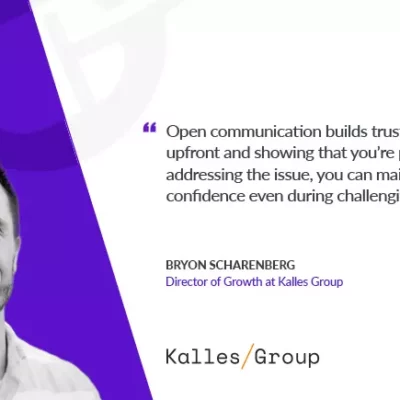It’s Bigger Than Data—Here’s Why It Matters
Did you know that 2 out of 5 cyberattacks target small and mid-sized businesses?* This stat can be surprising, but it’s a good reminder that no matter your company’s size, security isn’t optional—it’s foundational.
And while most of the headlines focus on data breaches and ransomware attacks, security is really about something much bigger: people. Yes, it’s about protecting customer data, but it’s also about empowering your organization to stay focused on its mission and vision—without being derailed by unnecessary risks.
I recently shared some thoughts on affordable website security in this interview with Website Planet.
The article focuses on security strategies for small businesses, but the principles—like being proactive, managing risk, and building secure systems—apply to companies of all sizes.
In fact, many of our mid-market and enterprise clients rely on these same core strategies to build trust with their customers and protect what matters most. And when you focus on trust, everything else tends to follow.
Security is About People, Not Just Systems
When most people think of “security,” they think of technical controls—firewalls, encryption, and anti-virus software. And while those are essential, they’re only one part of the bigger picture.
True security is about trust. It’s about earning your customers’ confidence and using that trust as a foundation for long-term relationships. But it doesn’t stop there.
Security also enables your business to stay on mission. When you’re not constantly putting out fires from breaches, threats, and vulnerabilities, your team can focus on growth, customer experience, and delivering on your company’s vision. That’s where security makes its biggest impact—not just on your IT infrastructure, but on your people, your goals, and your legacy.
3 Key Ways to Build Trust Through Better Security
1. Turn Compliance Into a Competitive Edge
Compliance isn’t just about “checking the box” for audits and certifications. It’s about showing your customers, partners, and regulators that you’re serious about protecting data. And that builds trust.
Companies that prioritize security compliance (like ISO 27001, SOC 2, NIST, etc.) often have a clear edge when bidding for contracts or pursuing larger deals. Why? Because it signals to customers, partners, and regulators that they take security seriously—not just when it’s required, but as a core part of how they operate. For many, it starts as a “must-have” to win business, but along the way, it becomes something more. They begin to see compliance as a way to build trust, stand out from competitors, and strengthen their organization from the inside out.
If you’re working toward ISO 27001, you’re not just building a binder of policies—you’re proving that you take risk management seriously. And that’s something customers and partners notice.
2. Build Defenses That Inspire Confidence
You don’t have to advertise every security initiative you’re working on, but people will notice the results. Secure login experiences, clear privacy notices, and smooth customer interactions are all signs of a well-run security program.
Think about your own experience as a customer. When you log into a financial app and see two-factor authentication, it gives you more confidence. When you know your data is encrypted, it builds more peace of mind. That’s why leading enterprises go beyond “bare minimum” security controls. They design systems that make their customers feel secure.
These subtle but powerful design choices—like multi-factor authentication, encrypted payment flows, and secure client portals—build customer confidence and differentiate brands from their competitors.
3. Align Security with Your Business Goals
Security should never be a “departmental issue” that lives only with IT. It’s a strategic business function. And if you do it right, it becomes a key enabler for growth.
When you have the right security posture, you can enter new markets, secure larger contracts, and build the kind of trust that unlocks growth opportunities. For example, a strong security framework allows companies to pursue ISO 27001 or CMMC certification, which is often required by large enterprise clients or government agencies.
Aligning security with growth isn’t just good for IT—it’s good for the entire organization. And it shows up in ways that are hard to measure but impossible to ignore: faster sales cycles, bigger deals, and more confident customers.
Take the next step toward building trust and protecting what matters most. Schedule a free consultation with Kalles Group today.
How Compliance Creates Opportunity, Not Just Obligation
Every company talks about “protecting data” as if it’s the end goal. But protecting data is the starting line, not the finish line.
If you want to create a lasting impact with your security program, start with trust. When customers trust you, they stay. When employees feel secure in their roles, they contribute more. When leadership knows risks are under control, they can focus on growth instead of firefighting.
That’s why we at Kalles Group work with mid-market and enterprise clients to create security strategies that do more than just “protect.” We help organizations build trust, align security with business growth, and protect what matters most.
Take the Next Step Toward Building Customer Trust
If you’re thinking about how to build trust and strengthen security in your organization, I’d be happy to be a resource and point you in the right direction. Whether you’re working toward ISO 27001 certification, tightening up compliance processes, or just trying to get a better handle on risk management, we are here to help.
Let’s talk. Drop me a message on LinkedIn or send me a note on our contact us page to to learn more about how we can support your security journey.
*Data pulled from Accenture’s Cybercrime study: 43% of all attacks target small/mid-sized businesses.


